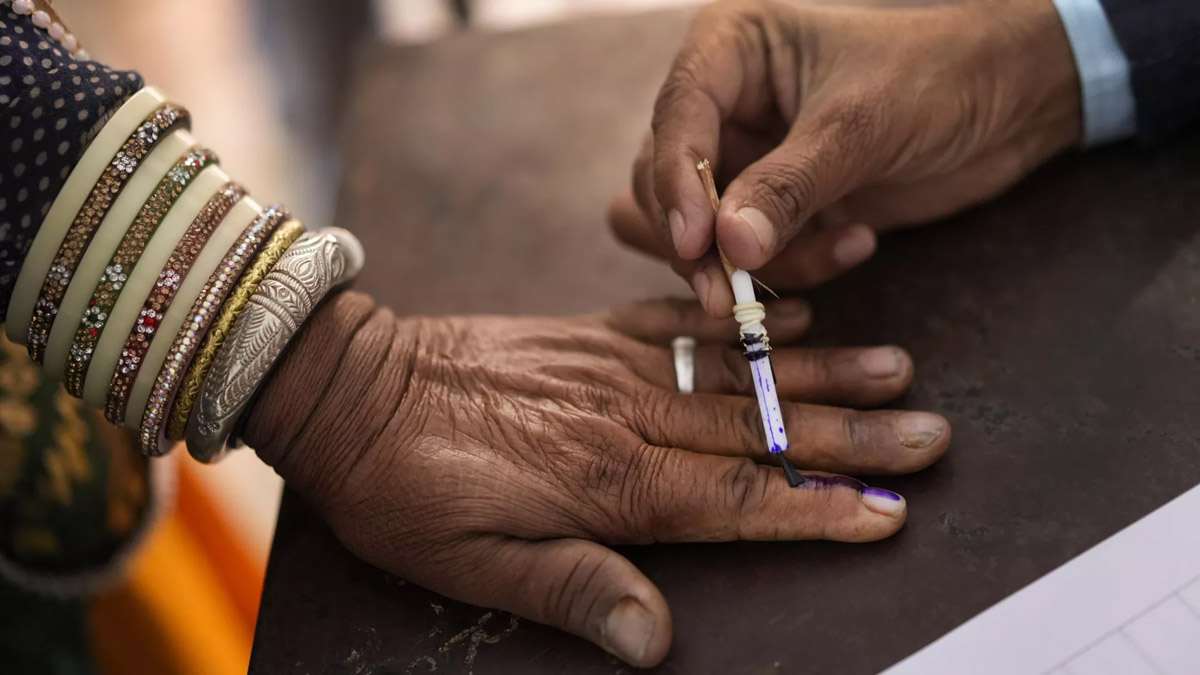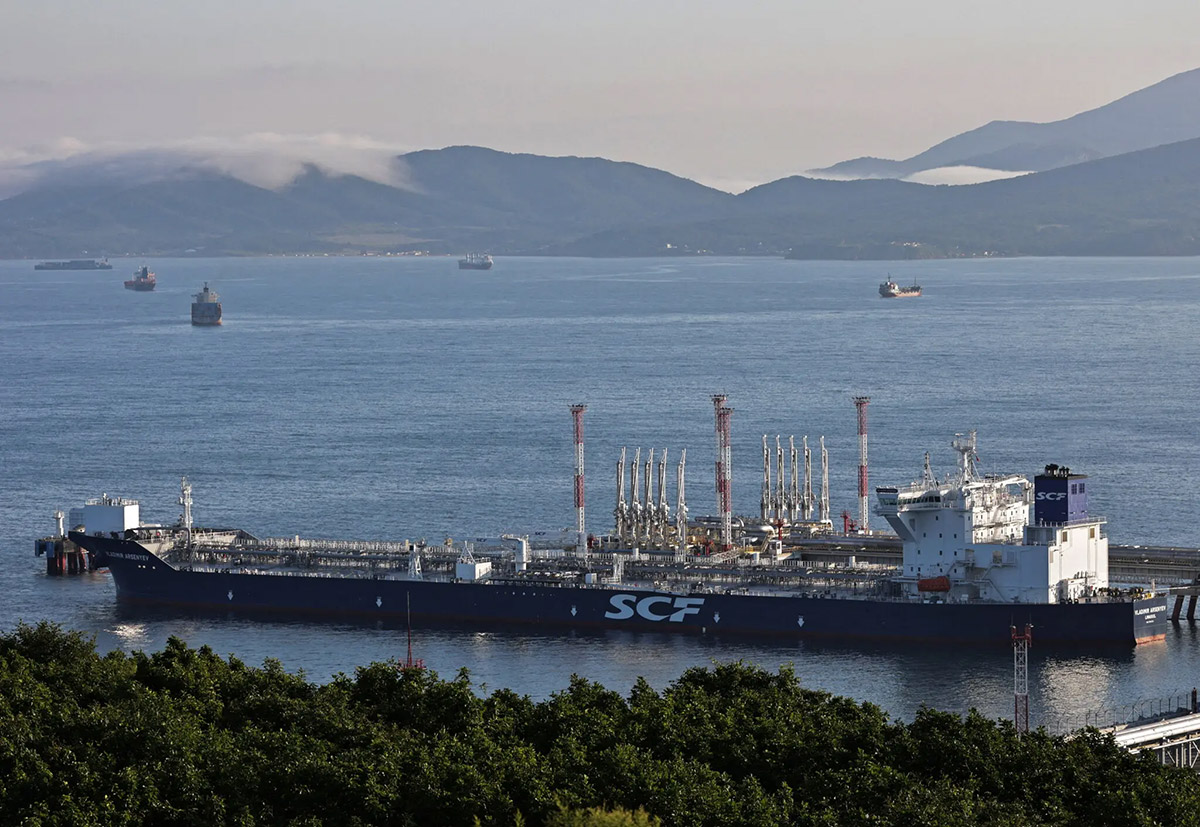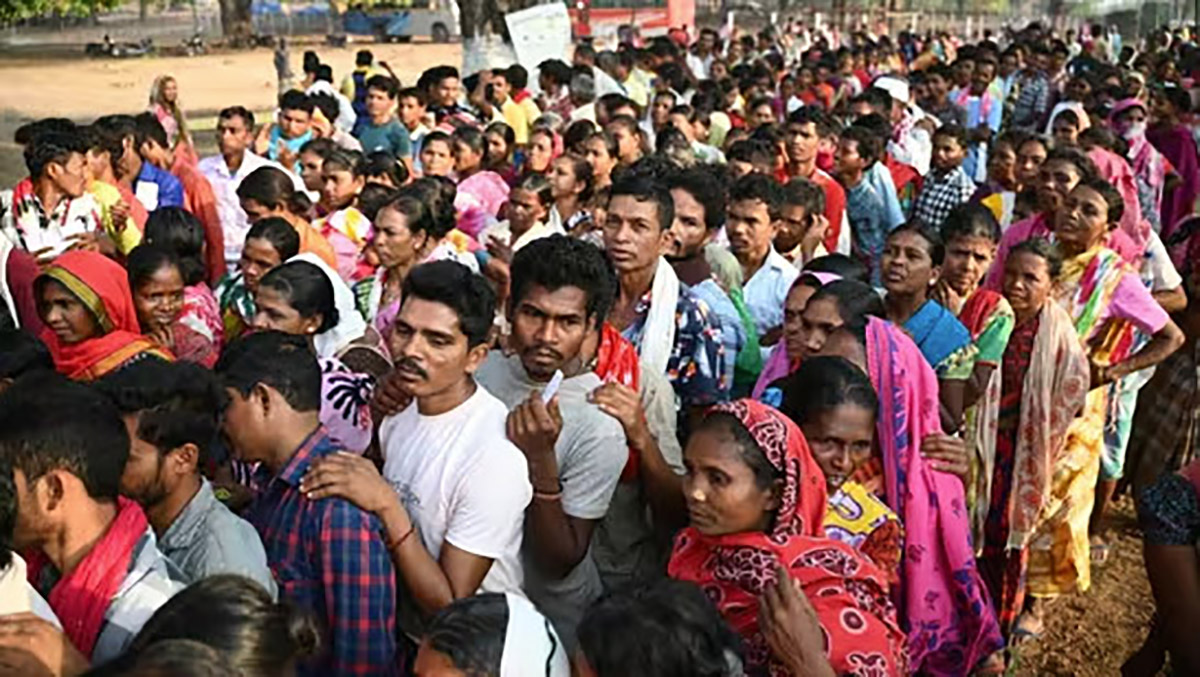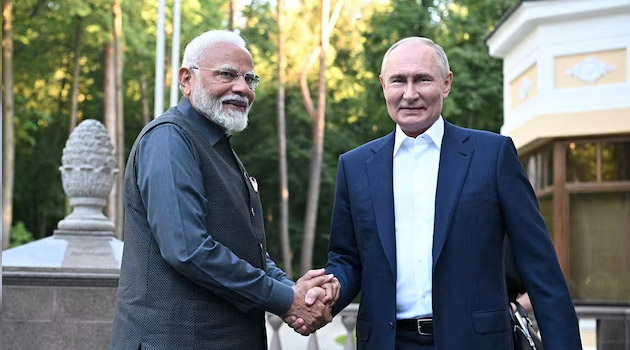Modi meets Russian President Vladimir Putin at his official state residence at Novo-Ogaryovo, near Moscow, July 8 2024.
Despite the decks being stacked in his and his party’s favour – more money, a pliant media and increasingly accommodating institutions (the judiciary and electoral commission in particular) – and despite rhetoric going into the campaign announcing and anticipating an even larger majority of 400 plus, the poll results showed a different story. Modi and the BJP suffered a setback in terms of seats won, falling short of the 272 required to win an outright majority. With 240 seats, the BJP was only able to form a government with the support of two coalition partners.

An Indian citizen is marked with the traditional indelible ink used to signify their vote has been cast.
Many commentators suggested that this would mark a return to the messy coalition politics that characterised India’s governments between 1989 and 2014. Analysts also expected Modi to recognise the verdict of the electorate and convey a sense of chastened humility and acknowledgement of the need to temper some of the tendencies that have become apparent over the last decade. A key question remains about whether a centralising and authoritarian Prime Minister will learn the lesson, demonstrate his ability to compromise and manage coalition politics, or whether he will double down, domestically and internationally. Early indications have been that he intends to carry on as if nothing has changed.
Modi in Russia to reaffirm ties
A significant indication of Modi’s attitude and likely approach to positioning India in the international system is that his first bi-lateral post-election visit will be to Moscow this week. The timing is significant, as it coincides with NATO’s 75th anniversary celebrations in Washington. So, whilst the majority of the ‘western alliance’, a group that has been courting India, is meeting to discuss how to respond to a revanchist Russia, Mr Modi and Mr Putin will be engaging in performative diplomacy of their own.
The messaging is clear. Whilst some might generously claim India is leveraging its standing with Moscow to temper Russian behaviour, others will more likely conclude that India is continuing to hedge its bets. This hedge is largely driven by a fear of China, with whom India cannot compete, let alone confront. India has always suffered when China and Russia’s strategic interests are aligned.
While China has materially and diplomatically supported Russia’s actions in Ukraine, India’s public line has been softer. While nervous about the Russia-China alignment, Modi nevertheless believes India has played an important role in helping Moscow counter Western actions, with India becoming the largest buyer of Russian seaborne oil in the world. Indian refiners are eager to take advantage of access to discounted Russian oil after sanctions shuttered the trade to Western markets, allowing funds to flow into the Russian economy and directly benefit the Russian treasury. India is also a major customer for Russia’s defence industry, with around 60% of its equipment and systems believed to be of Russian origin.

Russian seaborne oil imports equate to over 40% of all Indian oil imports.
Another indication of greater importance being attached to Russia is the appointment of Pavan Kapoor as Deputy National Security Adviser. Seen as one of India’s brightest and best diplomats, Kapoor returned from his posting as Ambassador in Moscow in April of this year to a promotion to Secretary West (one of the key senior diplomatic posts covering Europe, USA and the Middle East). His time in this role lasted three months and he is now given one of the plum geostrategic roles.
Domestic policies lean towards authoritarianism
Mr Modi’s budget will be presented on 22 July. It will provide an early indication of how his government intends to deliver on its promise to make India a developed economy by 2047. His challenges will include failing infrastructure, representing the thinness of his approach to heavy infrastructure-led growth; the creation of jobs, an increase in which has been remarkably absent despite India’s growth; rising inequality; and countering inflation.
So, whilst India has seemingly grown fast whilst maintaining a protectionist set of policies, Modi 3.0 will need to embark on some competent reform if it is to attract inward investment and promote itself as a reliable country in which to do business. The indications are that he will continue to struggle to identify new areas where growth is going to come from (currently the equity markets are driving most of the growth and even they have seen outflows of international capital). More likely is that Modi will continue to promote two or three local economic champions and continue the trend of a Russian-style crony capitalism and vindictiveness towards those who do not toe his line or who present a threat to his favourite Bollygarchs.

People queue up to cast their ballot outside a polling station in Chhattisgarh State in Central India on April 19, 2024
India’s slide towards a more authoritarian domestic political environment has continued in the legislative programme unveiled in the first week of July. In a much-vaunted effort to ‘Indianise’ legacies from the colonial era, new laws will replace the Indian Penal Code (IPC), Code of Criminal Procedure (CrPC) and Indian Evidence Act. Concerns have already been raised that the new codes have been poorly drafted and inadequately reviewed and debated by parliament, legal community stakeholders and the public at large. In a nod to the chaotic nature of Modi’s established approach to ensconcing autocracy in India, the new laws renumber almost every section of the code, while making only 12 substantive changes. These amendments bolster an already overbearing police and state apparatus and make the law enforcement and criminal justice system even more challenging for both victims of crime and those accused or suspected of wrongdoing.
The reaction from political opponents has been immediate. “The criminal laws which have come into force are pernicious in nature and they will be draconian in their implementation. They will lay the foundations of a Police State in this country, they will provide very wide latitude to the Police across the length and breadth of the country because of the very ambiguous nature in which certain provisions have been crafted – provisions with regard to bail are absolutely perverse in their nature,” said senior Congress MP Manish Tewari. While this assessment may be fair, there is little Congress can do to forestall the passing of the new codes into law.
Modi entrenching himself as India enters critical period
The coming period begins a pivotal five years for India. India’s prospects as a reliable international partner and place to do business over the next five years should not be taken for granted. Much will depend on whether Modi continues on his path or whether more tempering forces can prevail. His style of governance is likely to remain the same and unfettered by the strictures many thought coalition politics would impose on him. This is likely to cause some tension within the BJP. His performance will be watched over the next two years, and some key areas that might provide indications on his performance are:
- The results of state elections to be held over the rest of 2024: Delhi, Haryana, Maharashtra; Jammu and Kashmir, and Jharkand. How the BJP performs will be seen as a verdict on Modi 3.0. If Modi delivers less than conclusive victories, expect to see internal challenge or pressure on him to be more consensual. It might even be the case that there is pressure for him to decentralise power outside his immediate coterie and, for example, appoint a Deputy Prime Minister who is more amenable to the BJP leadership.
- Mohan Bhagwat, the chief of Rashtriya Swayamsevak Sangh (RSS), a right-wing, Hindu nationalist volunteer paramilitary organisation labelled the ‘ideological mentor’ to the BJP, has been critical of the personality driven politics that characterised the BJP’s election campaign. Modi is 74 and may face pressure to step down after he turns 75. If Bhagwat, who is currently 73, decides to set an example and voluntarily demit office at 75 the message to Modi will be clear.
- The BJP’s electoral showing in Uttar Pradesh, a traditional BJP fortress state of 240 million people, was a disaster. How the Chief Minister, Yogi Adityanath (who was sidelined in favour of a Modi-dominated cult of character campaign), responds in the next round of legislative (state) elections due to be held in 2027 will give an indication as to whether he sees himself as a contender for Modi’s crown.
Modi has two to three years to stave off internal party challenges that are currently bubbling under the surface. Outside the BJP, there is also the challenge posed by a rejuvenated Congress Party and the feeling that the BJP’s new coalition partners are biding their time before seeking to extract political advantage from a weakened Modi.
The Prime Minister has, however, so far shown no signs of having been chastened, evident in the manner which he has approached his government formation, international positioning and domestic priorities. Expect a more autocratic, protectionist and severe Modi whose response to the election will be to double down on the worst proclivities of his first two terms.
Key facts
- In the year to March 2024 India’s economy grew 8.2%. It recently supplanted the UK as the world’s 5th largest economy.
- GDP per capita has grown from $1,559 when Modi was elected in 2014 to $2,410 today.
- Over 66% of India’s 968 million registered voters turned out to vote in the election.
- On 4 June 2024 foreign institutional investors sold a record 124.36 billion rupees (USD $1.5 billion) of Indian shares, the worst day for Indian stocks in four years.
- India’s Russian oil imports hit 1.92 million bpd in June 2024, representing 42% of Indian oil imports.
